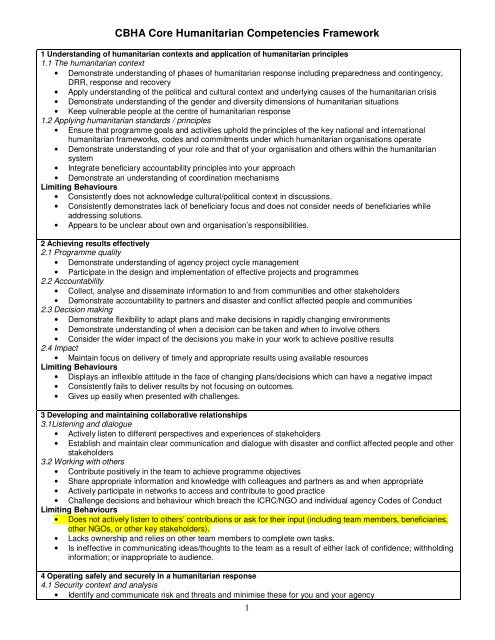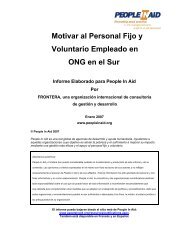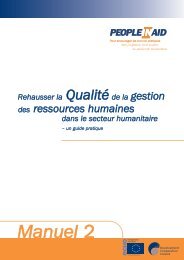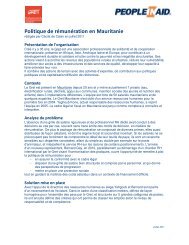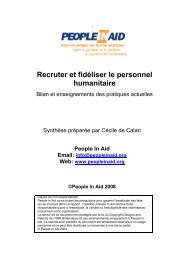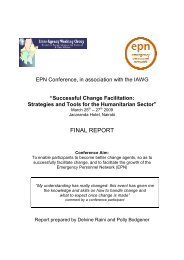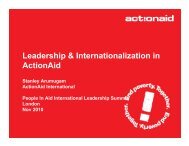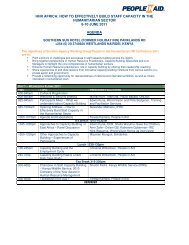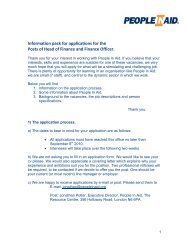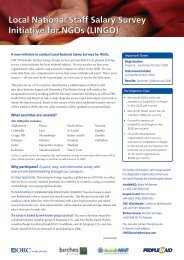CBHA Core Humanitarian Competencies Framework - People In Aid
CBHA Core Humanitarian Competencies Framework - People In Aid
CBHA Core Humanitarian Competencies Framework - People In Aid
You also want an ePaper? Increase the reach of your titles
YUMPU automatically turns print PDFs into web optimized ePapers that Google loves.
<strong>CBHA</strong> <strong>Core</strong> <strong>Humanitarian</strong> <strong>Competencies</strong> <strong>Framework</strong>1 Understanding of humanitarian contexts and application of humanitarian principles1.1 The humanitarian context• Demonstrate understanding of phases of humanitarian response including preparedness and contingency,DRR, response and recovery• Apply understanding of the political and cultural context and underlying causes of the humanitarian crisis• Demonstrate understanding of the gender and diversity dimensions of humanitarian situations• Keep vulnerable people at the centre of humanitarian response1.2 Applying humanitarian standards / principles• Ensure that programme goals and activities uphold the principles of the key national and internationalhumanitarian frameworks, codes and commitments under which humanitarian organisations operate• Demonstrate understanding of your role and that of your organisation and others within the humanitariansystem• <strong>In</strong>tegrate beneficiary accountability principles into your approach• Demonstrate an understanding of coordination mechanismsLimiting Behaviours• Consistently does not acknowledge cultural/political context in discussions.• Consistently demonstrates lack of beneficiary focus and does not consider needs of beneficiaries whileaddressing solutions.• Appears to be unclear about own and organisation’s responsibilities.2 Achieving results effectively2.1 Programme quality• Demonstrate understanding of agency project cycle management• Participate in the design and implementation of effective projects and programmes2.2 Accountability• Collect, analyse and disseminate information to and from communities and other stakeholders• Demonstrate accountability to partners and disaster and conflict affected people and communities2.3 Decision making• Demonstrate flexibility to adapt plans and make decisions in rapidly changing environments• Demonstrate understanding of when a decision can be taken and when to involve others• Consider the wider impact of the decisions you make in your work to achieve positive results2.4 Impact• Maintain focus on delivery of timely and appropriate results using available resourcesLimiting Behaviours• Displays an inflexible attitude in the face of changing plans/decisions which can have a negative impact• Consistently fails to deliver results by not focusing on outcomes.• Gives up easily when presented with challenges.3 Developing and maintaining collaborative relationships3.1Listening and dialogue• Actively listen to different perspectives and experiences of stakeholders• Establish and maintain clear communication and dialogue with disaster and conflict affected people and otherstakeholders3.2 Working with others• Contribute positively in the team to achieve programme objectives• Share appropriate information and knowledge with colleagues and partners as and when appropriate• Actively participate in networks to access and contribute to good practice• Challenge decisions and behaviour which breach the ICRC/NGO and individual agency Codes of ConductLimiting Behaviours• Does not actively listen to others’ contributions or ask for their input (including team members, beneficiaries,other NGOs, or other key stakeholders).• Lacks ownership and relies on other team members to complete own tasks.• Is ineffective in communicating ideas/thoughts to the team as a result of either lack of confidence; withholdinginformation; or inappropriate to audience.4 Operating safely and securely in a humanitarian response4.1 Security context and analysis• Identify and communicate risk and threats and minimise these for you and your agency1
<strong>CBHA</strong> <strong>Core</strong> <strong>Humanitarian</strong> <strong>Competencies</strong> <strong>Framework</strong>4.2 Personal safety and security• Build and maintain a reputation in line with humanitarian standards and acceptance for your work• Take appropriate, coordinated and consistent action to handle situations of personal risk and situations of riskfor others• Reduce vulnerability by complying with safety and security protocols set by your organisation andcontextualise appropriately to local scenarios• Champion the importance of safety and keep the safety of colleagues and team members in mind at all times4.3 Minimising risk to communities and partners• Take measures to do no harm and to minimise risks for your partners and the communities you work withLimiting Behaviours• Consistently presents ideas/opportunities that may be a risk to self or others.• Actively disregards or lacks clear understanding of security protocols leading to personal/ organisational risk.5 Managing yourself in a pressured and changing environment5.1 Resilience• Recognise stress and take steps to reduce it• Remain constructive and positive under stress to be able to tolerate difficult and sometimes threateningenvironments• Remain focused on your objectives and goal in a rapidly changing environment• Able to adapt to changing situations• Keep yourself emotionally stable when helping others5.2 Maintaining professionalism• Take responsibility for your own work and for the impact of your actions• Plan, prioritise and perform tasks well under pressure• Maintain ethical and professional behaviour in accordance with relevant codes of conduct• Demonstrate personal integrity by using one’s position responsibility and fairly• Be aware of internal and external pressures and how they might impact your effectivenessLimiting Behaviours• Demonstrates considerable stress and does not show signs of taking steps to reduce it.• Displays unprofessional conduct that is not in line with the relevant Code of Conduct & shows demonstrabledamage to reputation of agency.• Resists adapting behaviours & actions to changing environment.6 Leadership in humanitarian response6.1 Self-awareness• Show awareness of your own strengths and limitations and their impact on others• Demonstrate understanding of your skills and how they complement those of others to support teameffectiveness• Seek and reflect on feedback to improve your performance6.2 Motivating and influencing others• Communicate humanitarian values and motivate others towards them• <strong>In</strong>spire confidence in others• Speak out clearly for organisational beliefs and values• Demonstrate active listening to encourage team collaboration• <strong>In</strong>fluence others positively to achieve programme goals6.3 Critical judgement• Analyse and exercise judgement in new situations in the absence of specific guidance• Demonstrate initiative and ingenuity• Demonstrate tenacity to achieve solutions• Address difficult situations and make tough decisions confidently and calmly• Suggest creative improvements and different ways of workingLimiting Behaviours• Resists or delays taking decisions when it is clearly required.• Attempts to maintain control by not delegating effectively to cater to specific skills of team members resultingin lack of confidence among the team.• Puts forward problems without solutions.• Communicates without clarity or structure in a way that is generally pessimistic.2
<strong>CBHA</strong> <strong>Core</strong> <strong>Humanitarian</strong> <strong>Competencies</strong> <strong>Framework</strong>3


